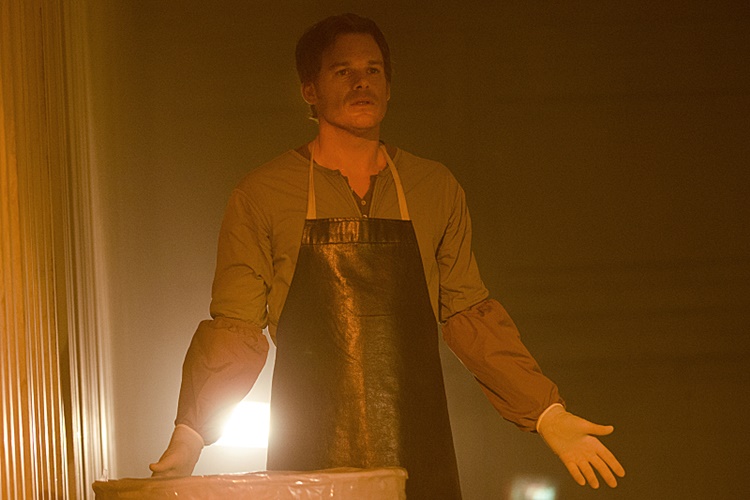It’s no secret that I watch a lot of movies and TV. It is an avenue for me to escape into other worlds and ponder the “what ifs.” What if mutants roamed the planet; what if every love story ends with the unlikely couple professing their love in an incredibly public place; what if crime was solved by individuals that have amazing CGI running through their heads; or, what if the protagonist is actually a bad person? This last question makes me think of the show Dexter. For those who have never seen Dexter, here is a one-line synopsis – Dexter is a serial killer who only kills those who have killed others. Week after week, we are left to ponder: is what he is doing right?
Dexter, from a global view, really has nothing to do with this week’s parsha, Noach. Dexter never needs to build an ark, and Noah never kills anyone. However, the two men are tasked to make what is wrong right. Most of us know this parsha. God tells Noah of his plan to destroy the world. Because God considers Noah a tzaddik, or “righteous” person, he instructed Noah to build an ark which would hold his family and two of every species on Earth. Noah does as he is commanded and when the flood comes, he, his family, and all of the creatures on board survive. After the waters subsided, Noah sends both a raven and a dove to search for dry land, and as we know, the dove returns with an olive branch in its beak. Noah and the passengers on the ark depart the ship, and God promises that never again would the world be destroyed by a flood.
As I was reading commentaries on Noach, I was shocked to find that many questioned and argued that Noah was not a righteous person. Some of them compared Noah to Abraham. As we will read in couple of weeks in Parsha Vayera, when God tells Abraham that he plans on destroying Sodom and Gomorrah, Abraham pleads with God not to destroy innocent people with the guilty ones. Noah, in contrast, does not say anything on behalf of humanity. In Toledot Yitzhak it reads, “Noah remained silent because he did not believe that God would really bring the flood to destroy all life. He lacked faith. He thought God was just going to frighten the wicked people of his generation into changing their evil and violent behavior. So he did not speak up and tell them to save themselves.” Another commentary from eighteenth century Chasidic master Rabbi Elimelech of Lizensk, who once observed two kinds of righteous people. He notes one is genuinely righteous, while the other dresses like a righteous person in a fur coat. Each of them faces freezing in a different way: one will go collect wood for a fire, while the other wraps himself in his fur coat. The one who collects wood lights a fire and invites others to join him. The one who makes himself cozy in his coat stays warm, but those around him freeze. For Elimelech, the person who shares warmth is genuinely righteous. In that sense, Noah was not truly righteous.
I now wonder if there can be an argument in favor of Noah being righteous. Rabbi Levi Yitzchak, like Elimelech, observed two kinds of tzaddikim (righteous people). One of these is unselfish, and as they walk with God, tries to bring his fellow creatures nearer. The other, a faithful and ardent servant of God, but concerns himself only with his own purity and religiosity and makes no attempt to bring others to his way of life. That is the kind of tzaddik that Noah was. Noah did no evil, but we do not find him performing good deeds, either. In a sense, Noah is an island, neither hurting others, nor helping them. This is the greatness of Noah, as well as the tragedy of Noah.
The Zohar recounts a conversation between Noah and God which took place after the flood. When Noah left the ark and saw the world destroyed, he began to cry before God and said, “Master of the universe, you are called compassionate. You should have been compassionate for your creations.” What did God respond? God said, “You are a foolish shepherd. Now you say this?! Why did you not say this at the time I told you that I saw that you were righteous among your generation, or afterward when I said that I will bring a flood upon the people, or afterward when I said to build an ark? I constantly delayed and I said, ‘When is he going to ask for compassion for the world?’ And now that the world is destroyed, you open your mouth, to cry in front of me, and to ask for supplication?” [Zohar Hashmatot, Bereishit 254b].
I have to admit that it saddens me to think that Noah, like the character Dexter, no matter the good that he may have done, will be perceived as not righteous. The lesson here is that we need to speak up and let our voices be heard, but also act. Participate. Engage. Share. Make what is wrong, right, like Noah and Dexter. Don’t be an island. It is our duty to share with others and stand together for righteous causes.

